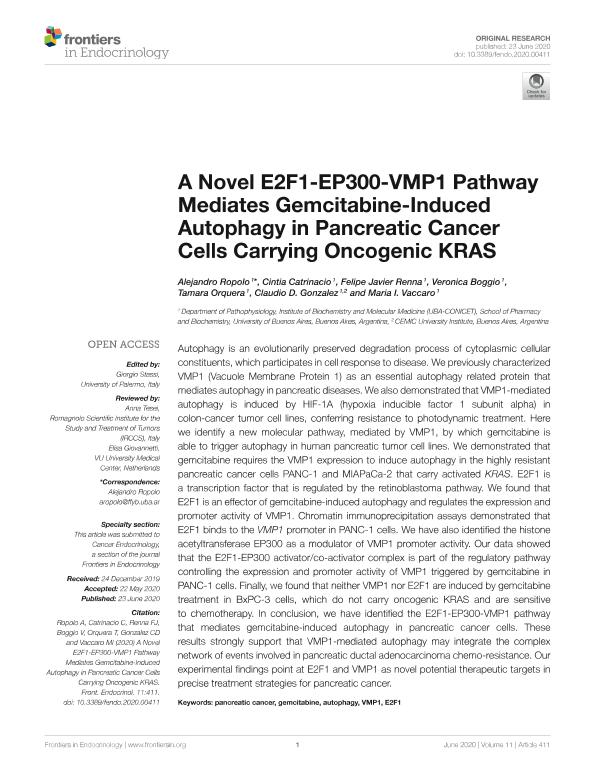Artículo
A Novel E2F1-EP300-VMP1 Pathway Mediates Gemcitabine-Induced Autophagy in Pancreatic Cancer Cells Carrying Oncogenic KRAS
Ropolo, Alejandro Javier ; Catrinacio, Cintia; Renna, Felipe Javier
; Catrinacio, Cintia; Renna, Felipe Javier ; Boggio, Veronica; Orquera, Tamara
; Boggio, Veronica; Orquera, Tamara ; González, Claudio Daniel; Vaccaro, Maria Ines
; González, Claudio Daniel; Vaccaro, Maria Ines
 ; Catrinacio, Cintia; Renna, Felipe Javier
; Catrinacio, Cintia; Renna, Felipe Javier ; Boggio, Veronica; Orquera, Tamara
; Boggio, Veronica; Orquera, Tamara ; González, Claudio Daniel; Vaccaro, Maria Ines
; González, Claudio Daniel; Vaccaro, Maria Ines
Fecha de publicación:
06/2020
Editorial:
Frontiers Media S.A.
Revista:
Frontiers in Endocrinology
ISSN:
1664-2392
Idioma:
Inglés
Tipo de recurso:
Artículo publicado
Clasificación temática:
Resumen
Autophagy is an evolutionarily preserved degradation process of cytoplasmic cellular constituents, which participates in cell response to disease. We previously characterized VMP1 (Vacuole Membrane Protein 1) as an essential autophagy related protein that mediates autophagy in pancreatic diseases. We also demonstrated that VMP1-mediated autophagy is induced by HIF-1A (hypoxia inducible factor 1 subunit alpha) in colon-cancer tumor cell lines, conferring resistance to photodynamic treatment. Here we identify a new molecular pathway, mediated by VMP1, by which gemcitabine is able to trigger autophagy in human pancreatic tumor cell lines. We demonstrated that gemcitabine requires the VMP1 expression to induce autophagy in the highly resistant pancreatic cancer cells PANC-1 and MIAPaCa-2 that carry activated KRAS. E2F1 is a transcription factor that is regulated by the retinoblastoma pathway. We found that E2F1 is an effector of gemcitabine-induced autophagy and regulates the expression and promoter activity of VMP1. Chromatin immunoprecipitation assays demonstrated that E2F1 binds to the VMP1 promoter in PANC-1 cells. We have also identified the histone acetyltransferase EP300 as a modulator of VMP1 promoter activity. Our data showed that the E2F1-EP300 activator/co-activator complex is part of the regulatory pathway controlling the expression and promoter activity of VMP1 triggered by gemcitabine in PANC-1 cells. Finally, we found that neither VMP1 nor E2F1 are induced by gemcitabine treatment in BxPC-3 cells, which do not carry oncogenic KRAS and are sensitive to chemotherapy. In conclusion, we have identified the E2F1-EP300-VMP1 pathway that mediates gemcitabine-induced autophagy in pancreatic cancer cells. These results strongly support that VMP1-mediated autophagy may integrate the complex network of events involved in pancreatic ductal adenocarcinoma chemo-resistance. Our experimental findings point at E2F1 and VMP1 as novel potential therapeutic targets in precise treatment strategies for pancreatic cancer.
Palabras clave:
AUTOPHAGY
,
E2F1
,
GEMCITABINE
,
PANCREATIC CANCER
,
VMP1
Archivos asociados
Licencia
Identificadores
Colecciones
Articulos(CEMIC-CONICET)
Articulos de CENTRO DE EDUCACION MEDICA E INVESTIGACIONES CLINICAS "NORBERTO QUIRNO"
Articulos de CENTRO DE EDUCACION MEDICA E INVESTIGACIONES CLINICAS "NORBERTO QUIRNO"
Articulos(IBIMOL)
Articulos de INSTITUTO DE BIOQUIMICA Y MEDICINA MOLECULAR
Articulos de INSTITUTO DE BIOQUIMICA Y MEDICINA MOLECULAR
Citación
Ropolo, Alejandro Javier; Catrinacio, Cintia; Renna, Felipe Javier; Boggio, Veronica; Orquera, Tamara; et al.; A Novel E2F1-EP300-VMP1 Pathway Mediates Gemcitabine-Induced Autophagy in Pancreatic Cancer Cells Carrying Oncogenic KRAS; Frontiers Media S.A.; Frontiers in Endocrinology; 11; 6-2020; 110-124
Compartir
Altmétricas



